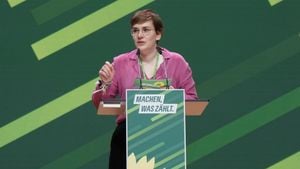Moscow has firmly stated it sees no conditions for resuming dialogue with Europe, marking another tense chapter in the deteriorated relations stemming from the Ukraine conflict. The Kremlin's spokesperson, Dmitri Peskov, articulated this position during a press conference on February 23, 2023, asserting, "Until now, we see no preconditions for resuming dialogue with Europe." He criticized European nations for their steadfast commitment to continuing the warfare, adding, "the Europeans continue to follow the path of sanctions, the path of convincing the necessity to continue war."
Peskov highlighted the apparent disconnect between Europe's beliefs and Russia's attempts to resolve the conflict peacefully, noting, "This conviction of the Europeans is entirely contrary to the state of finding ways to settle the conflict from Ukraine, which we are doing now with the Americans." He also noted the absence of any news related to anticipated agreements to bring the conflict to a close, comments which came amid rising tensions affecting both the East and West.
Sergei Lavrov, the Russian Foreign Minister, echoed Peskov's sentiments, stating, "Russia will not cease military operations until peace negotiations yield solid and lasting results satisfying Moscow." Lavrov firmly rejected any immediate ceasefire along the contact line without concrete agreements, critiquing the perceived inconsistency of European nations compared to the steadier stance of the United States.
Lavrov reaffirmed Russia's openness to negotiate with Ukraine and European leaders, stating, "We are open to negotiations with Ukraine and Europe, with anyone willing to genuinely help achieve peace." He emphasized the importance of the Istanbul agreements from spring 2022 as potential groundwork for future negotiations.
At the same time, Ukrainian officials have been adamant about needing security guarantees from their allies before any assurance can be made on halting hostilities. This seeming stalemate between Russia's insistence on concrete conditions and Ukraine's demand for security guarantees reflects the complexity of negotiating peace.
Interestingly, during the same timeframe, President Vladimir Putin had a telephone conversation with Chinese President Xi Jinping. This dialogue, reported by the Chinese Ministry of Foreign Affairs, centered around the latest developments concerning the Ukraine crisis. Putin informed Xi about Russia's commitment to resolving the conflict's root causes. Xi praised Russia's "positive efforts" and reiterated China’s support for the peace initiative it launched alongside Brazil and other Global South nations.
Both leaders underscored their countries' close ties, affirming mutual friendship and cooperation. "China and Russia are good neighbors and true friends who share prosperity and adversity, support one another, and pursue common development," Xi remarked, highlighting the strategic value of their bilateral relationship.
Putin reciprocated this sentiment, emphasizing Russia's priority on enhancing cooperation with China. He noted, "The development of our relations with China is Russia's long-term strategic choice; it is not influenced by temporary incidents and does not seek outside interference."
This confluence of dialogue among Russia, Europe, and China paints a complicated picture of international relations. While Russia positions itself as open for talks, the juxtaposition of its demands against Europe's actions complicates the possibility of any resolution to the Ukrainian crisis.
With both hardline positions being asserted by Moscow and the insistence from Western countries for more binding security guarantees for Ukraine, the path to establishing peace appears increasingly fraught with hurdles. Hence, as negotiations have yet to produce any substantial clarity or agreement, the specter of military conflict remains all too present.
With the backdrop of these developments, one wonders if peace can ever be achieved under the prevailing circumstances or whether the conflict will continue to fluctuate as nations vie for strategic advantage on the global stage. Understanding this dynamic becomes increasingly relevant as the struggle for resolution between Russia and Ukraine continues to evolve.



